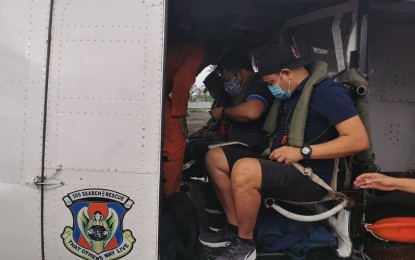
TO THE RESCUE. Personnel of the Regional Disaster Risk Reduction Management Council-Bicol are on their way to Catanduanes province Monday (Nov. 2, 2020) morning to check the situation on the ground. Super Typhoon Rolly (international name Goni) responders need not be tested for coronavirus disease 2019, Health Secretary Francisco Duque III said on Monday. (Photo courtesy of Jessar Adornado)
MANILA – Super Typhoon Rolly (international name: Goni) responders need not be tested for coronavirus disease 2019 (Covid-19), Health Secretary Francisco Duque III said on Monday.
"We want to clarify that our responders don't need to undergo (Covid-19) testing as long as they are asymptomatic and no history of exposure to a confirmed or probable case as certified by a physician," Duque said during a media briefing at the National Disaster Risk Reduction and Management Council in Camp General Emilio Aguinaldo, Quezon City.
He said this is stated in the Department of Health's Advisory No. 3 for Centers for Health Development and other health officials.
To ensure that Covid-19 does not spread in evacuation centers, Duque reiterated to local government units (LGUs) the importance of assigning safety officers in evacuation centers.
Safety officers would execute symptoms screening, clinical, and exposure assessment of evacuees to immediately identify and isolate Covid-19 suspects and probable cases.
Duque also advised LGUs to provide high-risk individuals -- those 60 years old and above, sick, pregnant, and children -- with separate rooms and to isolate those with symptoms in temporary treatment and monitoring facilities or separate rooms and evacuation centers.
As for the evacuees, Duque advised them to observe the minimum health standards such as handwashing, wearing face masks, and physical distancing not shorter than a one-meter distance from each other.
"There must be only one family in one classroom, keep evacuation centers well-ventilated, avoid touching eyes, nose, and mouth, and consult a doctor immediately in case of cough, sore throat, dizziness, and difficulty breathing," he said.
If going out and walking in the flood cannot be avoided, Duque instructed the public to wear protective gear or boots and to go to the nearest health center for post-exposure antibiotics or prophylaxis to avoid leptospirosis. (PNA)
